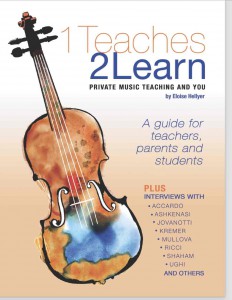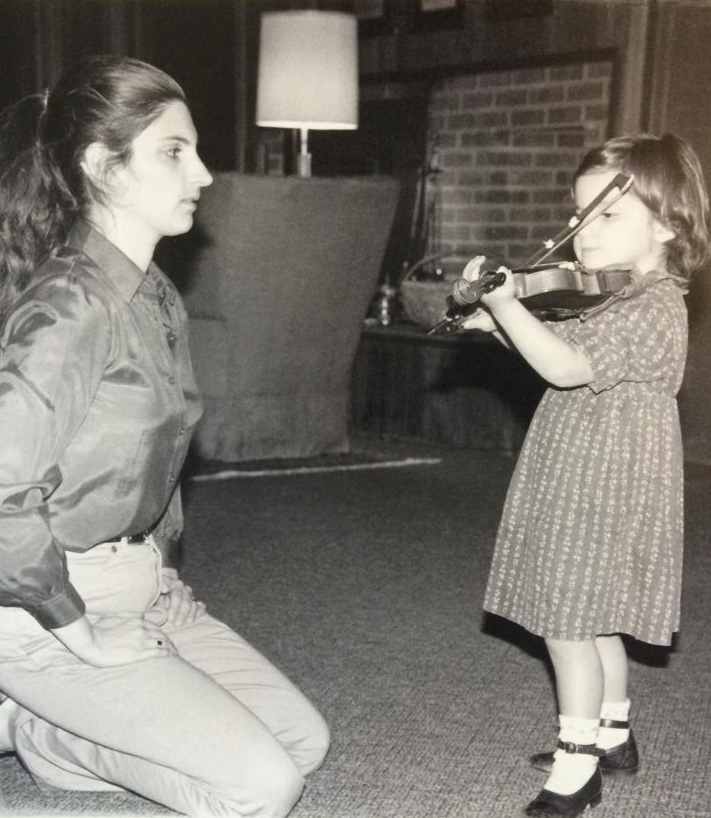To Teach or Not to Teach... Or, How to Teach Your Own Kids and Survive
Scenario 1. You are a doctor, lawyer, mechanic, and/or a stay-at-home parent but have no professional qualifications to teach anyone. You have a child. You homeschool your child. Many people applaud you, do not question your ability, and notice that home-schooled children often get into very good universities and have no problems fitting in socially. Everyone is happy.
Scenario 2. You are a musician. You have a child. You teach your child your musical instrument. Many people, namely other musicians, when you ask for help or advice, are horrified and vociferously protest on Internet forums that you must stop immediately and get your child another teacher. None of them seems to notice how many famous musicians, past and recent, were successfully taught by their own parents. Nor do they consider that there may be financial or logistical reasons for your decision—even if you plainly state them.
Recently, I saw a post on an Internet forum where a musician mother was having trouble teaching her son and asked for help. While she got a lot of good suggestions, many commenters outright and sometimes offensively told her that no one should ever teach their own child and to find another teacher pronto. Why do people get so emotional about this?
Well, for one thing, many of them have tried and not succeeded, which brings them to the conclusion that no one else can or should either. Instead, teaching your own child can be a wonderful thing to do if you observe a few basic principles.
First, let's look at the problems the OP had.
- Her child likes to rush through everything superficially.
- Her child doesn't like to practice.
Do these peccadillos sound familiar? Substitute the word "student" for "child," and you will see that these are problems any teacher faces with certain students. So why is this mother finding it so difficult?
She's invested. When you teach your own child, you are taking on an enormous responsibility, and it's easy to lose perspective. You are emotionally involved with your child, and thus you worry about all kinds of things that would never occur to you as a teacher of someone else's child. Let's face it; when you finish a lesson, your student leaves your studio, and you don't give her much thought until the next lesson. You are happy if she practices, but if she doesn't, you don't take it so personally; if you were to do so, you wouldn't survive long as a teacher.
It's another matter with your own children, however.
So how do you teach your own kids and survive?
- Be determined. Music is important, and learning it is just as important as learning good manners and personal hygiene. You have to be more determined than your child, which isn't always easy, but even if your child goes to another teacher, you would probably have to put up with the same problems anyway.
- See your child in function of himself. Not in function of you ruining him. Making him or her practice will not kill him or make him hate you (in the long run). Your child would probably give you a hard time about practicing even if she had another teacher.
- Keep perspective. do not assume your child (or your students either, for that matter) should be as you were: studious, disciplined, and compliant. So don't expect the same progress you made. Treat her as you would a student, but help her practice every day without exaggerating. Not everyone is going to be a professional, nor should they be, no matter how talented they are. We teachers sometimes forget that our reasons for playing music are not the same as everyone else's.
- Keep in mind that children often feel they can never be as good as their parents at anything, so why try? This can be one reason for lack of cooperation. That's pretty easy to address: "If you do as I'm telling you, you will play so much better than I ever have—I'm giving you all the shortcuts that no one gave me!" I have used this tactic with students with violinist parents or older siblings. I whisper, "Do you want to play better than...?" Even the most recalcitrant always answers, "Yes." "So, do as I tell you, and you will do so much sooner than you ever thought!" It has worked so far.
- Keep in mind also that children will be grateful that you thought enough of them to spend time trying to give of yourself and give them something important and meaningful. They may not feel this way until they're 40, but it's worth remembering in dark moments.
Why should you teach your own child?
- As this mother, you can't find a teacher for him and couldn't afford to pay for one anyway.
- You want to give your child your culture—share with her something important to you. As my first teacher told my mother back in the 1950s, violinists usually come from families of violinists. Obviously, that is no longer the case, but I'll bet we all know why he said that.
Why shouldn't you teach your own child?
- If you want to, I can't think of a single reason why you shouldn't, any more than I can think of superficial reasons why you shouldn't homeschool him.
- If you have to, I can think of a lot of reasons why you should. Choosing between no lessons at all and studying with you is a no-brainer if you want your child to have the privilege of playing music.
It may be easier to let another teacher take on the main responsibility, but no one should criticize a priori your decision to share something you love with your child.
Many have successfully done so in the past, and many are now. So why shouldn't you?
Share this:
Buy it on www.sharmusic.com - eBook format, avaliable worldwide, paperback in North America
COPYRIGHT
ABOUT
A music teacher’s thoughts and observations on the teaching and the study of a musical instrument, hoping to be of help to parents, students and teachers.
PHOTO
AWARDED TOP 25 VIOLIN BLOG
CATEGORIES
TAGS
ARCHIVES
-
Agosto 2022
Agosto 2023
Agosto 2024
April 2015
April 2016
April 2017
April 2019
April 2020
Aprile 2022
Aprile 2023
Aprile 2024
August 2014
August 2015
August 2016
August 2017
August 2018
August 2019
August 2021
December 2014
December 2015
December 2016
December 2017
December 2018
December 2019
December 2020
Dicembre 2022
Dicembre 2023
Dicembre 2024
Febbraio 2022
Febbraio 2023
Febbraio 2024
February 2015
February 2016
February 2018
February 2019
February 2020
February 2021
Gennaio 2022
Gennaio 2023
Gennaio 2024
Giugno 2022
Giugno 2022
Giugno 2023
Giugno 2024
January 2015
January 2016
January 2017
January 2018
January 2019
January 2020
July 2015
July 2017
July 2019
June 2016
June 2017
June 2018
June 2019
June 2020
June 2021
Luglio 2022
Luglio 2023
Luglio 2024
Maggio 2022
Maggio 2023
Maggio 2024
March 2015
March 2016
March 2017
March 2018
March 2019
March 2020
March 2021
Marzo 2022
Marzo 2023
Marzo 2024
May 2015
May 2016
May 2018
May 2019
May 2020
November 2014
November 2015
November 2016
November 2017
November 2018
November 2019
November 2021
Novembre 2022
Novembre 2023
Novembre 2024
October 2014
October 2015
October 2017
October 2018
October 2019
October 2020
October 2021
Ottobre 2022
Ottobre 2023
Ottobre 2024
September 2014
September 2015
September 2016
September 2018
September 2019
September 2020
September 2021
Settembre 2022
Settembre 2023
Settembre 2024
RECENT POSTS
Terry G and Me, or Terry Gilliam on Where (or What) Practicing the Piano Will Get You…
The Teaching We Don’t Do Is More Important Than We Think
Overwhelmingness or What Teaching and Motherhood* Have in Common
Cellphone Serenity
How to Build Your Reputation – the Kind You Want
Desperate Times, Desperate Measures. Or How to Deal With Your Strong-Willed Stubborn Student and Survive
“Why Does My Teacher Get So Frustrated?” Letter to a Perplexed Student
Mount Rush-no-more….And How to Get There
Realizzato con VelociBuilder - Another Project By: Marketing:Start! - Privacy Policy




